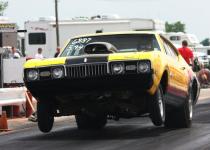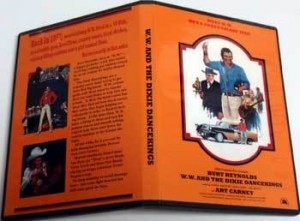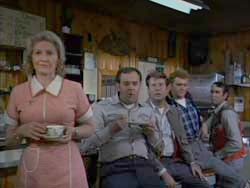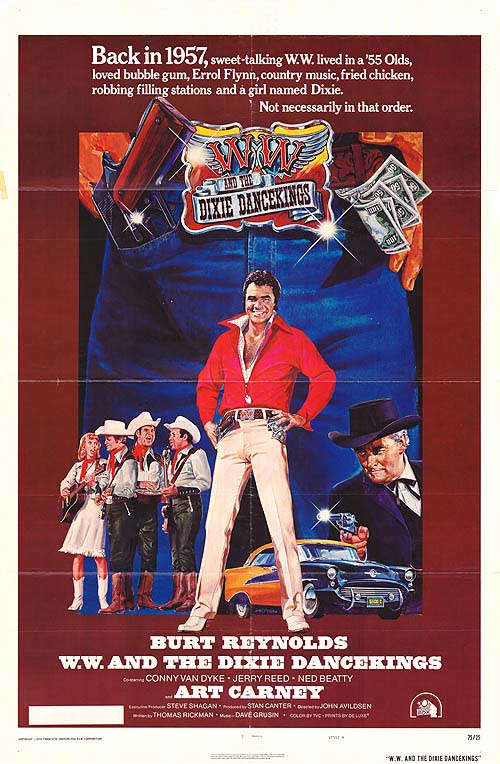From Monthly Film Bulletin, September 1975, Vol. 42, No. 500. — J.R.
W.W. and the Dixie Dancekings
U.S.A..1975
Director: John G. Avildsen
Cert—A. dist–Fox-Rank. p.c–20th Century-Fox. exec. p–Steve
Shagan. p–Stanley S. Canter. p. manager–William C. Davidson. asst. d
–Ric Rondell, Jerry Grandey. sc–Thomas Rickman. ph–Jim Crabe.
col–TVC; prints by DeLuxe. ed–Richard Halsey, Robbe Roberts. a.d—
Larry Paull. set dec–JimBerkey. sp. effects–Milt Rice. m–Dave Grusin.
songs–“Hound Dog” by Jerry Leiber, Mike Stoller, sung by Elvis
Presley; “Goodnight, Sweetheart, Goodnight” by Calvin Carter, James
Hudson; “Johnny B. Goode” by Chuck Berry; “Bye Bye Love” by
Felice Bryant, Boudleaux Bryant; “I’m Walkin’” by Antoine “Fats”
Domino, Dave Bartholomew; “Blue Suede Shoes” by Carl Lee Perkins;
“Mama Was a Convict” by Tom Rickman, Tim Mclntire; “A Friend” by
Jerry Reed; “Dirty Car Blues” (traditional), performed by Furry Lewis.
cost–Dick LaMotte. titles–PacificTitle. sd. rec–Bud Alper. sd. re-rec—
Don Bassman. stunt co-ordinator–Hal Needham. l.p–Bert Reynolds
(W.W. Bright), Art Carney (Deacon John Wesley Gore), Conny Van Dyke
(Dixie), Jerry Reed (Wayne), Ned Beatty (Country Bull), Richard D.
Herst (Butterball),Don Williams (Leroy), Mel Tillis (lst Good Ole Boy),
James Hampton (Junior), Furry Lewis (Uncle Furry), Sherman G. Lloyd
(Elton Bird), Mort Marshall (Hester Tate), Bill McCutcheon (2nd Good Ole
Boy), Peg Murray (Della), Sherry Mathis (June Ann), Roni Stoneman
Hemrick (Ticket Lady), Charles S. Lamb (Dude), Nancy Andrews (Rosie),
Tootsie (Herself), Shirlee Strother (Secretary), Virgilia Chew (Elton Bird’s
Secretary), Stanley Greene (Chauffeur Powell), Frank Moore (June Ann’s
Boss), Fred Stuthman (Sourface), Cathy Baker (1st Dixiebelle), Heidi
Hepler (2nd Dixiebelle), Polly Holliday (Mrs. Cozzens), Lorene Mann
(1st Delorosa Sister), Rita M. Figlio (2nd Delorosa Sister), Sudie Callaway
(3rd Delorosa Sister), Mickey Salter (1st Elvis), Hal Needham (Trooper
Carson), Gil Rogers (Street Preacher), Gil Gilliam (Boy with Radio).
8,161 ft. 91 mins. Original running time–94 mins,
The mid-1950s. After holding up a Southland Oil petrol station
in Georgia, good-naturedly giving part of the take to the attendant
to keep him quiet, and subsequently fleeing from the police, W.W.
Bright enters a gym where a dance is being held and quickly takes
over the bandstand as emcee, gaining the co-operation of the band
— Dixie and the Dancekings — when a policeman arrives. Claiming
to be a successful country music promoter, W.W. next insists on
taking the group to an ‘audition’ in Tennessee in Rosie’s Nashville
Corral. The night-club proves to be a sleazy dive and no job offers
are forthcoming, but W.W. persuades the group to trust him as a
manager — after making an unsuccessful pass at Dixie — and holds
up another Southland Oil station, bribing the attendant as before.
Meanwhile Elton Bird, president of Southland Oil, hires former
lawman Deacon John Wesley Gore to track down the person
holding up his stations across the country. W.W. buys outfits for
the band and abortively tries to hold up another station; the
attendant gives Gore a description of W.W., his black and gold
Oldsmobile and the band, which Gore reads on a radio revival show.
W.W. takes the band to Opryland and then tries to persuade one
of the singers, Country Bull Jenkins, to write a song for the group,
but changes his mind when Jenkins shows too much interest in
Dixie. After failing in his attempt to hold up a drive-in bank, W.W.
hides out with the band in Alabama, in the shack of Negro blues
singer Uncle Furry; W.W. burns his car and narrowly escapes Gore.
Because his robberies are endangering the band, W.W. decides to
leave, but has second thoughts after Dixie offers to sleep with him
and he hears the group playing again. He takes them to Nashville,
persuades Jenkins to let them perform at Opryland, and is then
arrested by Gore. But Gore lets him go just as they arrive at the
police station: it is just past midnight, Sunday morning, and Gore
is too religious to turn in someone on the Lord’s day.
For all its corny car chases, flashy optical transitions and silly
plot expediencies (like the incredible reprieve granted the hero at
the end), W.W. and the Dixie Dancekings conveys an unmistakable
affection for its title characters, milieu and period that is as
unexpected as it is refreshing in this branch of semi-computerised
cinema. Taking charge with an impeccable Southern accent, Burt
Reynolds establishes W.W.’s credentials as a hillbilly Robin Hood
in the opening scene, when he lackadaisically holds up a filling
station while retaining the good will of the attendant with cheerful
sympathy and a bribe (“My daddy said there are two thangs that
keep the world go-in — one is need an’ one is greed”); only later do
we discover that his robberies of Southland Oil stations and his
instant rapport with the attendants stem from his once holding the
same job himself. A good-natured con artist is, of course, an essential
part of the Reynolds persona; what largely distinguishes the role
here is its location in a place and time (Deep South, early Elvis)
that can sustain it in social terms — as the high-flown hope of the
hopeless — without the accompanying misogyny, cynicism and
violence of a Robert Aldrich context. Veering in the opposite direction
from The Mean Machine, W.W. may occasionally sin on the sticky
side, but it yields a lot of indelible local flavour along the way:
hand-stamping for identiflcation purposes at a small-town dance;
W.W. expounding on the merits of Errol Flynn in The Sun Also
Rises to his date at a drive-in; his tear-jerking speech about Koreawhen Leroy
remarks, “You talk lak one-a them Communists or somethin’ “; Dixie’s proud
assertion of her sexual selectivity; Furry Lewis’ wonderful “Dirty Car Blues”, and the
ceremonial, quasi-religious burning of the sacred Oldsmobile that follows. The
mystique of performing in Opryland is realised much more concretely here than in
Nashville (with its very different virtues), precisely because it is recognised and
honoured on its own terms and not as the emblem of some higher order. Only Art
Carney — distinctly out of his element as the fanatical Deacon, and evidently
bewildered by the ethnic trappings of his villainous part — seems foreign to the
warm spirits, graceful interplay and authenticity of this likeable down-home farce.
JONATHAN ROSENBAUM





